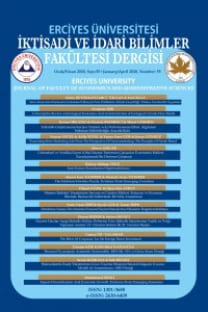Covıd-19 İle Mücadelede OECD ve AB Üye Ülkeleri Karşısında Türkiye’nin Etkinliğinin Değerlendirilmesi
Günümüzde Covid-19 ile mücadele tüm ülkelerin en önemli gündem konusudur. Ülkeler karantina, test ve aşı uygulamaları ile tıbbi tedavi hizmetinden oluşan politikalar uygulayarak Covid-19 ile mücadele etmeye çalışmaktadır. Dünya nüfusu ile birlikte mevcut test ve aşı üretim kapasitesi göz önünde bulundurulduğunda bu kaynakların etkin kullanımı pandemi ile mücadele açısından büyük öneme sahip olmaktadır. Bu nedenle çalışmada Türkiye’nin de içerisinde yer aldığı 41 OECD ve AB üye ülkesinin pandemi ile mücadele sürecindeki göreli etkinliği Veri Zarflama Analizi yöntemiyle değerlendirilmektedir. Yapılan analiz sonucuna göre; ülkeler ortalama 0,675 teknik etkinlik değeri ile etkinlik sınırından uzaktır. 41 ülkeden sadece 8’i pandemi ile mücadelede göreli teknik etkinliğe sahiptir. Görece teknik etkinlik değeri en düşük olan ülke Şili iken, görece teknik etkin olmayan ancak etkinlik sınırına en yakın olan ülke İrlanda olmaktadır. ABD ve Kanada gibi gelişmiş ve zengin ülkelerin pandemi ile mücadelede düşük performans sergilediği görülmektedir. Türkiye de teknik etkinliği yakalayamayan ülkeler arasında yer almaktadır. Türkiye’nin teknik etkinlik sınırını yakalayabilmesi için referans kümesinde yer alan ülkeleri dikkate alarak, vaka ve test sayısını %90 oranında azaltırken, iyileşen sayısını %758 oranında artırması gerekmektedir.
Anahtar Kelimeler:
Covid-19 ile Mücadele, Veri Zarflama Analizi, OECD ve AB Üyesi Ülkeler
Evaluation of Turkey’s Effectiveness Against OECD And EU Member Countries in Fighting Covid-19
Today, the fight against COVID-19 is the most important agenda topic of all countries. Countries are trying to combat COVID-19 by implementing policies consisting of quarantine, testing and vaccination practices and medical treatment service. Considering the current test and vaccine production capacity with the world population, the effective use of these resources is of great importance in terms of combating the pandemic. For this reason, the relative efficiency of 41 OECD and EU member countries in the fight against the pandemic is analyzed with the help of Data Envelopment Analysis. According to the results of the analysis; Only 8 of 41 countries have relative technical effectiveness in combating the pandemic. The country with the lowest relative technical efficiency value is Chile, while the country with relatively low technical efficiency but closest to the efficiency limit is Ireland. It is seen that countries that are among the developed and richest countries such as the USA and Canada are among the countries with the worst performance in the fight against the pandemic. Turkey, on the other hand, is among the countries that can not achieve technical efficiency.
___
- Avkiran, N. K. (2001). Investigating Technical and Scale Efficiencies of Australian Universities Through Data Envelopment Analysis. Socio-Economic Planning Sciences, 35, 57-80.
- Banker, R. D., Charnes, A., ve Cooper, W. W. (1984). Some Models for Estimating Technical and Scale Inefficiencies in Data Envelopment Analysis, Management Science, 30(9), 1078- 1092.
- Bowlin, W. F. (1998). Measuring Performance: An Introduction to Data Envelopment Analysis (DEA). The Journal of Cost Analysis, 15(2), 3-27.
- Breitenbach, M. C, Ngobeni, V., ve Aye G. C. (2020). Global Healthcare Resource Efficiency in the Management of COVID-19 Death and Infection Prevalence Rates. MPRA Working Paper.
- Breitenbach, M. C., Ngobeni, V., ve Aye, G. C. (2020). Efficiency of Healthcare Systems in the first wave of COVID-19 - a technical efficiency analysis. MPRA: Munich, Germany, 2020.
- Charnes, A., Cooper, W. W., ve Rhodes, E. (1978). Measuring the Efficiency of Decision Making Units. European Journal of Operational Research, 2, 429-444.
- Dyson, R. G., Allen, R., Camanho, A. S., Podinovski, V. V., Sarrico, C. S., ve Shale, E. A. (2001). Pitfalls and Protocols in DEA. European Journal of Operational Research, 132(2), 245-259.
- Ergülen A., Bolayır B., Ünal Z. ve Harmankaya İ. (2020). Covid-19 sürecinde Türkiye’nin etkinliğinin veri zarflama analizi ile değerlendirilmesi. Gümüşhane Üniversitesi Sosyal Bilimler Enstitüsü Elektronik Dergisi, 11(Ek), 275-286.
- EURONEWS. (2020, Mayıs 4). Dünyada Covid-19: ilk 4 ayında neler yaşandı? Salgının seyri ne durumda? Erişim adresi https://tr.euronews.com/2020/05/04/dunyada-covid-19-salg-n-n-ilk-100-gununde-yasananlar-ilk-nerede-ortaya-c-kt-nas-l-yay-ld
- Farrell, M. J. (1957). The Measurement of Productive Efficiency. Journal of the Royal Statistical Society, 120(3), 253-290.
- Ghasemi, A., Boroumand, Y., Researcher, I., ve Shirazi, M. (2020). How Do Governments Perform in Facing COVID-19? MPRA.
- Golany, B., ve Roll, Y. (1989). An Application Procedure for DEA. Omega, 17(3), 237-250.
- Selamzade, F., ve Özdemir, Y. (2020). COVID-19`a karşı OECD ülkelerinin etkinliğinin VZA ile değerlendirilmesi. Turkish Studies, 15(4), 977-991.
- Shirouyehzad, H., Jouzdani, J., ve Karimvand, M. (2020). Fight Against COVID- 19: A Global Efficiency Evaluation based on Contagion Control and Medical Treatment, J. Appl. Res. Ind. Eng. 7(1), 13-24.
- Tarım, A. (2001). Veri Zarflama Analizi: Matematiksel Programlama Tabanlı Göreli Etkinlik Ölçüm Yaklaşımı. Ankara: Sayıştay Yayınları.
- Özden, Ü. H. (2008). Veri Zarflama Analizi (VZA) ile Türkiye’deki Vakıf Üniversitelerinin Etkinliğinin Ölçülmesi. İstanbul Üniversitesi İşletme Fakültesi Dergisi, 37(2), 167-185.
- Vassiloglou, M., ve Giokas, D. (1990). A Study of the Relative Efficiency of Bank Branches: An Application of Data Envelopment Analysis. Journal of the Operational Research Society, 41(7), 591-597.
- You S., ve Yan H. (2011). A new approach in modeling undesirable output in DEA model. Journal of the Operational Research Society, 62(12), 2146-2156. Wordometer. (2021, Haziran 23). Erişim adresi https://www.worldometers.info/coronavirus/#countries
- ISSN: 1301-3688
- Yayın Aralığı: Yılda 3 Sayı
- Başlangıç: 1981
- Yayıncı: -
Sayıdaki Diğer Makaleler
Finansal Tablo Manipülasyonlarının Tespitinde Yapay Sinir Ağlarının Kullanılması
İş-Yaşam Dengesinin İşe Tutkunluk Üzerine Etkisi: Yer Hizmetleri Çalışanları Üzerinde Bir Araştırma
Gülnur İLGÜN, Seda SÖNMEZ, Gülsüm KOCA
Örgütsel Dedikodunun İş Stresi Üzerindeki Etkisinin İncelenmesi Üzerine Bir Araştırma
Hanehalkı Su Talebini Etkileyen Faktörler: Türkiye Üzerine Bir Uygulama
Osmanlı Maliyesi Defterlerinden 1280 R. (1864 M.) Tarihli Bucak Sancağı Masarifat Defterinin Tahlili
İsmail BEKCİ, Ali APALI, Eda KÖSE
İşgücü Piyasa Koşullarının Mevcut Çalışma Saatine Etkileri
Behice CANATAN, Gökhan ÖZBİLGE, Egemen İPEK
Demiryolu Hizmetlerinin Özelleştirilmesine Dair Teorik Bir İnceleme
